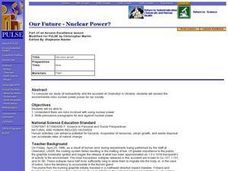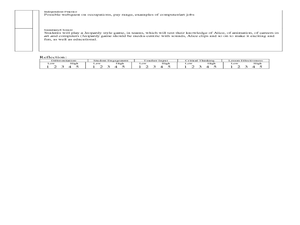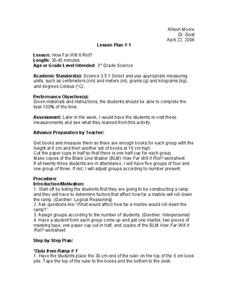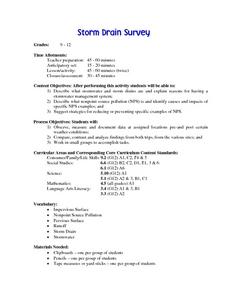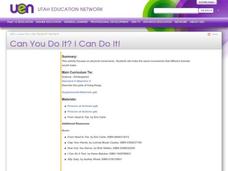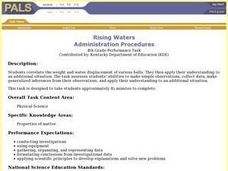Curated OER
Rate of Cooling Experiment
Ninth graders measure the insulation properties of different fabrics by immersing cans of water covered with fabric "socks" in an ice bath and measuring temperature changes. They then calculate heat loss and graph the data individually.
Curated OER
African Savanna
First graders are introduced to the ecosystems of savannas throughout the world. Using new vocabulary, they identify and describe the characteristics of a savanna and the animals that live there. They also describe the Earth's physical...
Curated OER
Introduction to Biomes
Fifth graders use scientific skills and processes to recognize how living things depend on one another and on the environment for survival and the human use of natural resources impacts the environment. Explain how Earth's surface...
Curated OER
Our Future - Nuclear Power?
Students comprehend that there are risks involved with using nuclear power. They write persuasive paragraphs for and against nuclear power. Students analyze the environmental issues and risks with nuclear power.
Curated OER
Art as a profession
Learners research a possible career in computer animation. In this computer animation lesson plan, students research the amount of money you could make in computer animation and the kinds of jobs you could acquire.
Curated OER
Creating a 3d Model and Corresponding Topographic Map
Young scholars create a landform model and topographic map. In this topography lesson, learners use a real landform to create a model and topographic map to scale.
Curated OER
Lobster Models
Learners create and label a model of a lobster. In this lobster lesson, students become familiar with the parts of a lobster and their functions. Learners display their lobsters in the classroom.
Curated OER
Humans and Trash
First graders identify items for trash or recycling. In this humans and trash lesson, 1st graders are given a piece of trash and must determine how an animal's habitat would be affected if the item was included. Students discuss how to...
Curated OER
How Far Will It Roll?
Third graders investigate physics by conducting an experiment. In this gravity lesson, 3rd graders create a ramp using books and paper which they roll a marble down. Students utilize the scientific method to predict and record data...
Curated OER
Fossil Imprints
Third graders discover fossil imprints. In this fossil lesson, 3rd graders get a piece of clay and create their own fossil imprints using animals provided by the teacher. They share their fossils with their partner and complete a data...
Curated OER
The Rain Cycle
Third graders draw the rain cycle. In this rain cycle lesson the students listen to the story The Legend of the Bluebonnet by Tommie DePola. As they listen to the story they sketch what is happening. The students write a sentence for...
Curated OER
Colors of Wildlife
Students observe wildlife animals. In this wildlife lesson, students cut out three different animals from a wildlife magazine. Then they compare the animals, verbally stating their similarities and differences.
Curated OER
Stormy Weather
Fifth graders compare human and wildlife environments. In this stormy weather lesson, 5th graders imagine they are an animal or human during a storm. Students compose a story with comparisons and reasons for how an organism's habitat...
Curated OER
Cell Cycle Duration
Learners examine the cell cycle and how its duration can vary. In this cells lesson students complete a worksheet and answer questions.
Curated OER
Mineral Identification
Eighth graders examine the properties that are used to identify minerals and how they work. In this investigative lesson students use the six properties to identify minerals that they are given.
Curated OER
Sound; Year 1
Learners, on a listening walk around the school and its grounds, make notes/comments on the range and variety of sounds in each environment. They listen to recorded sounds and attempt to recognize them.
Curated OER
Energy Balance: The Ins and Outs
Pupils review data from a 24-hour dietary recall to gain an understanding of the information regarding energy intake and macronutrients.
Curated OER
The Skeleton Within
Fourth graders explore the bones, joints, and other attributes of the skeletal system.
Curated OER
What a Waste!
Fourth graders explore the kidney, bladder, and function of the excretory (urinary) system.
Curated OER
Sunbeam Dining
Students learn at least two different things that animals eat, then construct a food chain and play a food chain game.
Curated OER
Storm Drain Survey
Young scholars describe what stormwater and storm drains are. They explain reasons for having stormwater management system. They describe nonpoint source pollution and identify causes and impacts of it.
Curated OER
Can You Do It? I Can Do It!
Students explore animal movements. They listen to the book, 'From Head to Toe,' discuss the animal movements, and imitate the animal actions during a rereading of the story.
Curated OER
Rising Waters
Fourth graders rank balls by size from smallest to largest and from lightest to heaviest and then by how much they made the water rise. They then discuss why certain balls make the water rise higher than do other balls.
Curated OER
Density and Buoyancy Experimental Design
Students must plan, design, and conduct an experiment that answers the scientific question: "Come up with a question that addresses the factors (variables) of the water and its effect on whether an object floats or sinks."





